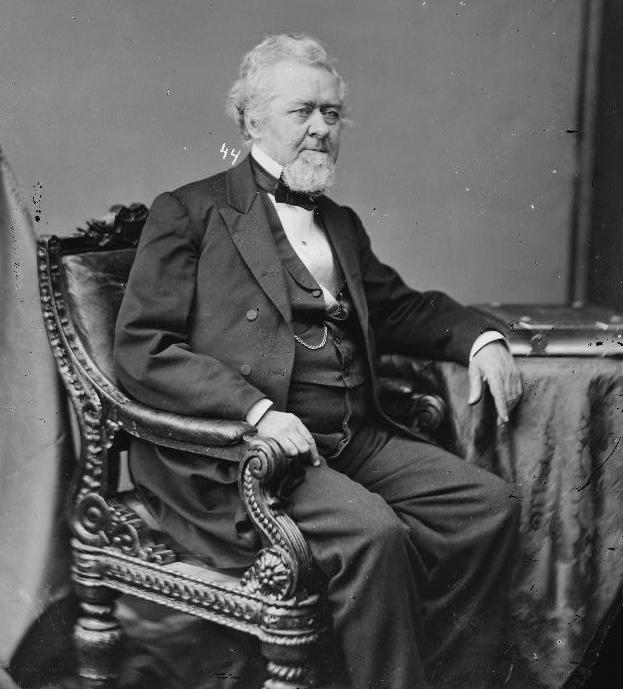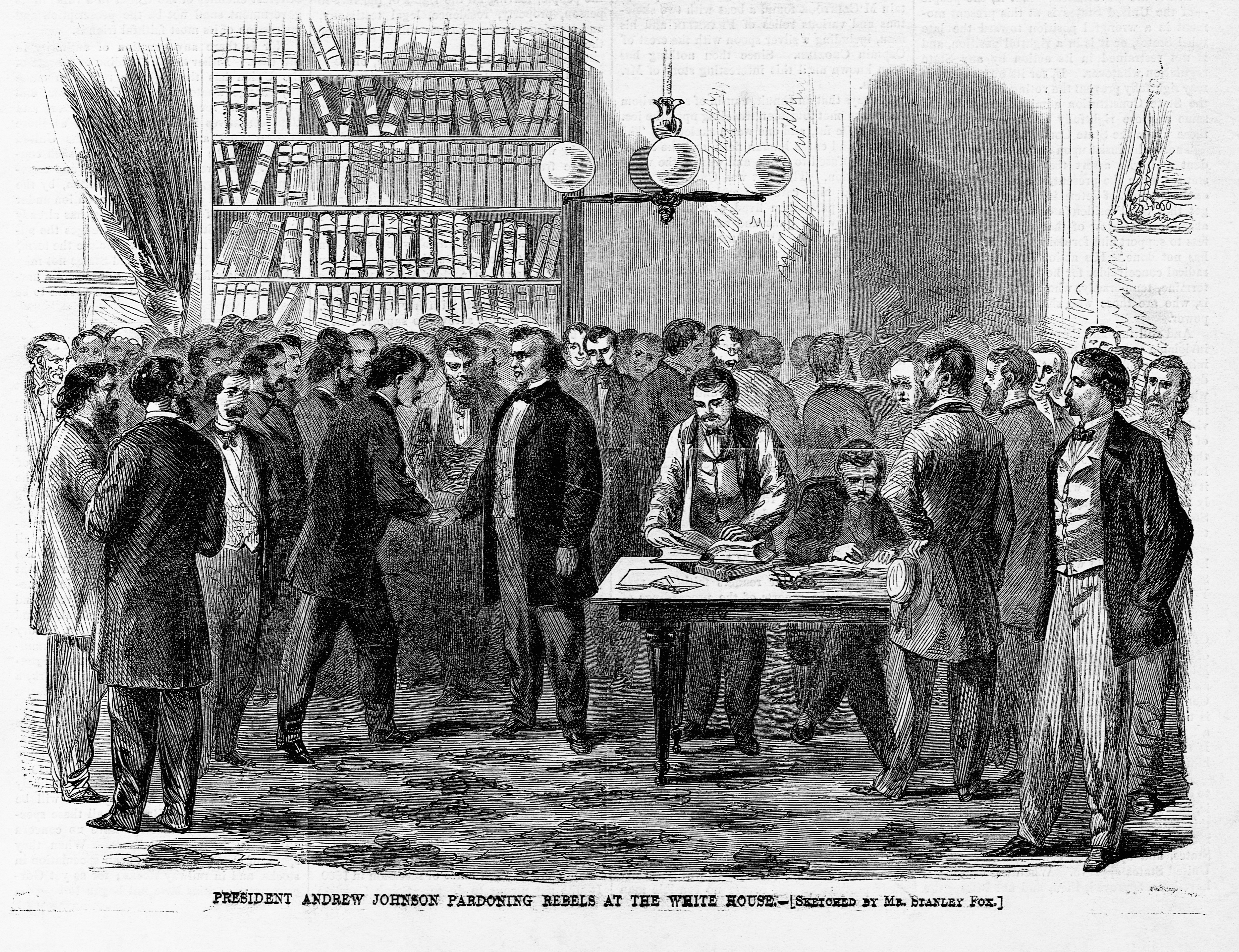|
First Impeachment Inquiry Into Andrew Johnson
The first impeachment inquiry against Andrew Johnson was launched by a vote of the United States House of Representatives on January 7, 1867, to investigate the potential impeachment of the President of the United States, Andrew Johnson. It was run by the House Committee on the Judiciary. The vote authorizing the inquiry was viewed as giving Republicans an opportunity to register their disdain for Johnson without formally impeaching him. Most congressmen had expected that the sentiments in House Committee on the Judiciary would side against impeachment. However, surprising many, the committee voted 5–4 on November 25, 1867, to recommend impeachment (after having held a preliminary vote against it months prior). Despite this recommendation, the House voted 57–108 on December 7, 1867, against impeaching Johnson, with more Republicans voting against impeachment than for it. This impeachment inquiry preceded the second impeachment inquiry into Andrew Johnson (launched in Jan ... [...More Info...] [...Related Items...] OR: [Wikipedia] [Google] [Baidu] |
Andrew Johnson
Andrew Johnson (December 29, 1808July 31, 1875) was the 17th president of the United States, serving from 1865 to 1869. The 16th vice president, he assumed the presidency following the assassination of Abraham Lincoln. Johnson was a Southern Democrat who ran with Lincoln on the National Union Party ticket in the 1864 presidential election, coming to office as the American Civil War concluded. Johnson favored quick restoration of the seceded states to the Union without protection for the newly freed people who were formerly enslaved, as well as pardoning ex-Confederates. This led to conflict with the Republican Party-dominated U.S. Congress, culminating in his impeachment by the House of Representatives in 1868. He was acquitted in the Senate by one vote. Johnson was born into poverty and never attended school. He was apprenticed as a tailor and worked in several frontier towns before settling in Greeneville, Tennessee, serving as an alderman and mayor before bei ... [...More Info...] [...Related Items...] OR: [Wikipedia] [Google] [Baidu] |
Midwestern States
The Midwestern United States (also referred to as the Midwest, the Heartland or the American Midwest) is one of the four census regions defined by the United States Census Bureau. It occupies the northern central part of the United States. It was officially named the North Central Region by the U.S. Census Bureau until 1984. It is between the Northeastern United States and the Western United States, with Canada to the north and the Southern United States to the south. The U.S. Census Bureau's definition consists of 12 states in the north central United States: Illinois, Indiana, Iowa, Kansas, Michigan, Minnesota, Missouri, Nebraska, North Dakota, Ohio, South Dakota, and Wisconsin. The region generally lies on the broad Interior Plain between the states occupying the Appalachian Mountain range and the states occupying the Rocky Mountain range. Major rivers in the region include, from east to west, the Ohio River, the Upper Mississippi River, and the Missouri River. The 2020 U ... [...More Info...] [...Related Items...] OR: [Wikipedia] [Google] [Baidu] |
Independent Republican (United States)
In the politics of the United States, Independent Republican is a term occasionally adopted by members of United States Congress to refer to their party affiliation.For example, see (e.g. 1875-1877): It is also used at the state level by individuals who loosely identify with the ideals of the national Republican Party but who choose not to formally affiliate with the party (i.e. chooses to be an '' independent''). Independent Republican is not a political party. Several elected officials, including members of Congress, have identified as ''Independent Republicans''. It has generally been used by members of Congress who have considered themselves to be members of the Republican Party, but who did not receive the nomination of the Republican Party and therefore ran against and defeated the Republican Party's official candidate in the general election. Examples include Thomas S. Butler, who served from 1897 to 1928 from Pennsylvania, Henry K. Porter, who served from 1903 to 1 ... [...More Info...] [...Related Items...] OR: [Wikipedia] [Google] [Baidu] |
Unconditional Union Party
The Unconditional Union Party was a unionist political party in the United States during the American Civil War. It was a regional counterpart to the National Union Party that supported the wartime administration of Abraham Lincoln. The party was active in the border states and Union-occupied areas of the Confederacy. After the war, it formed the nucleus of the Republican Party in the Upper South. Following the commencement of hostilities in April 1861, Unionists won critical elections in Kentucky and Maryland ahead of the July 4 emergency session of Congress and established provisional governments in Missouri and the western counties of Virginia. Emancipation and the enlistment of Black soldiers split the Unionist movement, with Radicals embracing calls for the immediate abolition of slavery in response to wartime exigencies. Factional strife culminated in a formal schism between the Conservative Unionists and the Radicals, who called themselves the Unconditional Union ... [...More Info...] [...Related Items...] OR: [Wikipedia] [Google] [Baidu] |
High Crimes And Misdemeanors
The charge of high crimes and misdemeanors covers allegations of misconduct by officials. Offenses by officials also include ordinary crimes, but perhaps with different standards of proof and punishment than for non-officials, on the grounds that more is expected of officials by their oaths of office. United Kingdom The impeachment of the King's Chancellor, Michael de la Pole, 1st Earl of Suffolk in 1386 was the first case to use this charge. One charge under this heading alleged that de la Pole broke a promise to Parliament to follow the advice of a committee regarding improvement of the kingdom. Another charge said that because he failed to pay a ransom for Ghent, the city fell to the French. The 1450 impeachment of William de la Pole, 1st Duke of Suffolk, a descendant of Michael, was the next to allege charges under this title. He was charged with using his influence to obstruct justice as well as cronyism and wasting public money. Other charges against him included act ... [...More Info...] [...Related Items...] OR: [Wikipedia] [Google] [Baidu] |
Veto Power In The United States
In the United States, the president can use the veto power to prevent a bill passed by the Congress from becoming law. Congress can override the veto by a two-thirds vote of both chambers. All state and territorial governors have a similar veto power, as do some mayors and county executives. In many states and territories the governor has additional veto powers, including line-item, amendatory and reduction vetoes. Veto powers also exist in some, but not all, tribal governments. In federal government A bill that is passed by both houses of Congress is presented to the president. Presidents approve of legislation by signing it into law. If the president does not approve of the bill and chooses not to sign, they may return it unsigned, within ten days, excluding Sundays, to the house of the United States Congress in which it originated, while Congress is in session. The president is constitutionally required to state any objections to the bill in writing, and Congress is requi ... [...More Info...] [...Related Items...] OR: [Wikipedia] [Google] [Baidu] |
Pardons For Ex-Confederates
Both during and after the American Civil War, pardons for ex-Confederate States of America, Confederates were given by US presidents Abraham Lincoln and Andrew Johnson and were usually extended for those who had served in the military above the rank of colonel or civilians who had exercised political power under the Congress of the Confederate States, Confederate government. The Federal pardons in the United States, power to pardon offences to the US government was given to the chief executive in the US Constitution under Article Two of the United States Constitution#Clause 1: Command of military; Opinions of cabinet secretaries; Pardons, Article II. Abraham Lincoln On December 8, 1863, in his annual message to United States Congress, Congress, President Lincoln outlined his plans for Reconstruction era, reconstruction of the Southern United States, South, which included terms for amnesty to former Confederates. A pardon would require an oath of allegiance, but it would not restore ... [...More Info...] [...Related Items...] OR: [Wikipedia] [Google] [Baidu] |
Federal Pardons In The United States
Federal pardons in the United States are granted only by the president of the United States, U.S. president, pursuant to authority under the U.S. Constitution to grant "Pardon#Related concepts, reprieves and pardons for offenses against the United States". Pardons extend to all Federal crime in the United States, federal criminal offenses, except in cases of impeachment, and entail various forms of clemency, including commutation of sentence, commuting or postponing a sentence, remitting a fine or restitution, delaying the imposition of a punishment, and providing amnesty to an entire group or class of individuals. The pardon power extends to cases involving courts-martial against members of the United States Armed Forces, including the United States Army, Army, the United States Navy, Navy, the United States Air Force, Air Force, the United States Marine Corps, Marine Corps, the United States Coast Guard, Coast Guard, and the United States Space Force, Space Force. The president ... [...More Info...] [...Related Items...] OR: [Wikipedia] [Google] [Baidu] |




